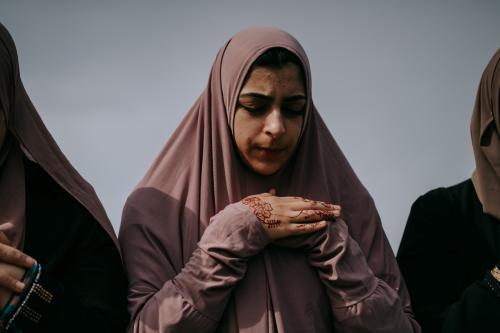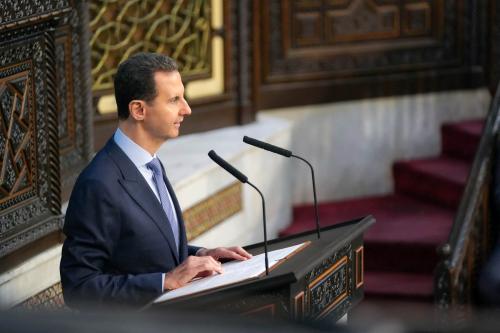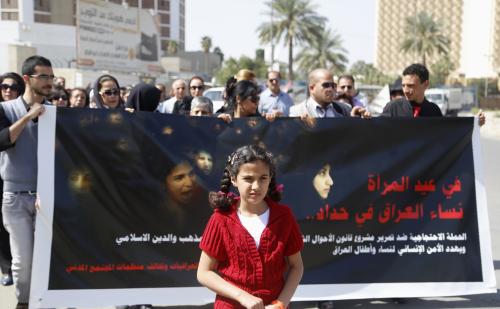On the eve of the latest round of nuclear talks between Tehran and the international community, Iran’s supreme leader Ayatollah Ali Khamenei delivered one of his trademark jeremiads against Washington. His remarks were laced with suspicion and indifference to the ostensible purpose of the dialogue, the resolution of the nuclear impasse, and they underscore the challenge of devising a detailed, rigorous agreement that can withstand the brunt of the entrenched rancor from Iran’s highest authority.
Khamenei is hardly alone in his pessimism. In a conversation held at the Saban Forum in December, President Obama gauged the odds of reaching a comprehensive nuclear agreement with Iran at 50 percent or less. As diplomats gathered today in Vienna for a dinner and press conferences in advance of the negotiations, Western officials sought to dampen any irrational exuberance about the likelihood of early progress or a successful long-range outcome, noting that “(t)his is the beginning of what will be a complicated, difficult and lengthy process.”
Today’s speech continued something of a pattern for Khamenei. He has offered scathing public denunciations of American perfidiousness as a prelude to each round of negotiations with the P5+1 since the reinvigoration of diplomacy last fall, a practice that suggests a greater investment in the outcome than his contemptuous rhetoric on the negotiating process acknowledges.
In September, the Supreme Leader advocated “heroic flexibility” in Iran’s diplomacy — a phrase widely interpreted as an endorsement of more constructive diplomacy — but also reminded his audience of Revolutionary Guard commanders that Washington “promotes war, poverty and decadence” and uses the nuclear issue as a pretext for undermining Iran’s revolutionary greatness. And then in November, he foreshadowed the signing of the interim accord with by fulminating against a (distorted) laundry list of Washington’s historic crimes.
Given the timing, and his explicit references to the nuclear negotiations, Khamenei’s latest speech made headlines around the world, but the simple truth is that nothing he said today constituted news. The Supreme Leader’s distrust of Washington and his disinterest in negotiations have long been a matter of public record. Indeed, in his remarks today, Khamenei specifically invoked statements he had made nearly a year ago, when he proclaimed that he did not object to talks with Washington but saw little possibility of progress through them.
Still, even if his latest speech contained no obvious shift in his position, Khamenei’s words will be carefully parsed by the international negotiators in Vienna, simply because he is Iran’s ultimate decision-maker. And historically, his attitude has determined the options available to the world for addressing Iran’s nuclear ambitions.
In 2003, Khamenei initially — and apparently quite grudgingly — approved a deal with Britain, France and Germany that indefinitely suspended the most alarming elements of Iran’s nuclear activities. Two years later, he opted to walk away from the bargain, a step that set in motion the severe intensification of sanctions and Iran’s creeping isolation from world markets and the international community. Fast-forward to June 2013, when Khamenei acceded (or perhaps even helped to orchestrate) the elevation of the same man who negotiated the 2003 nuclear compromise, Hassan Rouhani, to the Iranian presidency, with an explicit mandate to reconstruct a diplomatic exit for Iran from the standoff.
Even with this shift in direction, it has surely not slipped from anyone’s memory — least of all that of Rouhani or his designated negotiator, Foreign Minister Mohammad Javad Zarif — that Khamenei spent the intervening years denouncing the 2003 accord as a “retreat” that risked Iran’s progress and independence in exchange for the false promises of the West. He appears to have accorded Rouhani wide berth to try to secure a deal, endorsing the most Western-oriented cabinet in Iran’s post-revolutionary history and permitting unprecedented overtures toward Washington, such as the September 2013 phone call between Rouhani and Obama. Still, Khamenei has taken pains at every opportunity to reiterate the profound antipathy he harbors toward the United States and his conviction that Washington’s real aim is regime change in Iran.
In his latest speech, Khamenei did not disavow the negotiations or the interim agreement that was concluded in November 2013, but he made clear his abiding skepticism of the talks and his deeply-rooted suspicions about U.S. policy. He asserted that “(w)hat the Foreign Ministry and administration officials have started with regard to the nuclear talks will continue, and Iran will not violate what it has started, but all people should be aware of the fact that the U.S. is hostile toward the Islamic Revolution and Islam, and this hostility will not end through negotiations.”
As evidence of supposed American bad faith, Khamenei alluded to a parsimonious Obama administration statement released last week calling for the release of Iran’s most prominent political prisoners, former prime minister Mir Husayn Mousavi and former parliamentary speaker Mehdi Karroubi. The two men, and Mousavi’s wife the academic Zahra Rahnavard, recently began their fourth year under grueling house arrest for their roles in protests that erupted after Iran’s 2009 presidential election.
It should not be overlooked that Khamenei’s latest speech — as with all of his recent rhetoric on the issue — continued to offer explicit and important support for Rouhani and the negotiating process. And Iran’s urbane, American-educated Foreign Minister emphasized Khamenei’s pledge to stand by the interim deal in his own comments from Vienna. Still, this does not obviate, and it should not overshadow, the fact that Khamenei remains unwavering in his loathing and suspicion of Washington, sentiments he has expressed consistently for the past three decades.
Despite the successes scored to date in achieving an interim nuclear accord, finalizing the implementation plan, and launching talks on a comprehensive deal, Khamenei’s animosity is no small issue. It means that Iran’s negotiators will be operating in the relatively narrow space between Khamenei’s grudging go-ahead for diplomacy and the negativity that lies barely beneath the surface.
There is a tendency to seek some equivalence in the obstacles confronting the nuclear diplomacy within the political establishments of both America and Iran, and until recently anxieties about the prospects for negotiations centered on a barely-averted Congressional push for additional sanctions against Tehran. However, while there are skeptics and hard-liners on both sides, the distinction in leadership attitudes is significant. President Obama came into office determined to engage Iran, and continued to probe the possibilities for diplomacy even when Iran’s political climate appeared at its least fortuitous. He has rejected maximalist terms as unrealistic and repeatedly, forcefully lobbied for a diplomatic resolution to the nuclear crisis, even in the face of domestic distrust and allied outrage.
Meanwhile, Iran’s head of state continues to disparage his own officials’ diplomatic initiatives, insisting that the nuclear negotiations are “of no use and will not lead anywhere.” It may take as long as a year to ascertain if Zarif and his P5+1 counterparts can prove Khamenei wrong, and to determine how he will react if indeed they do.



Commentary
As Nuclear Talks Resume, Iran’s Supreme Skeptic Dismisses Prospects for Diplomacy
February 17, 2014